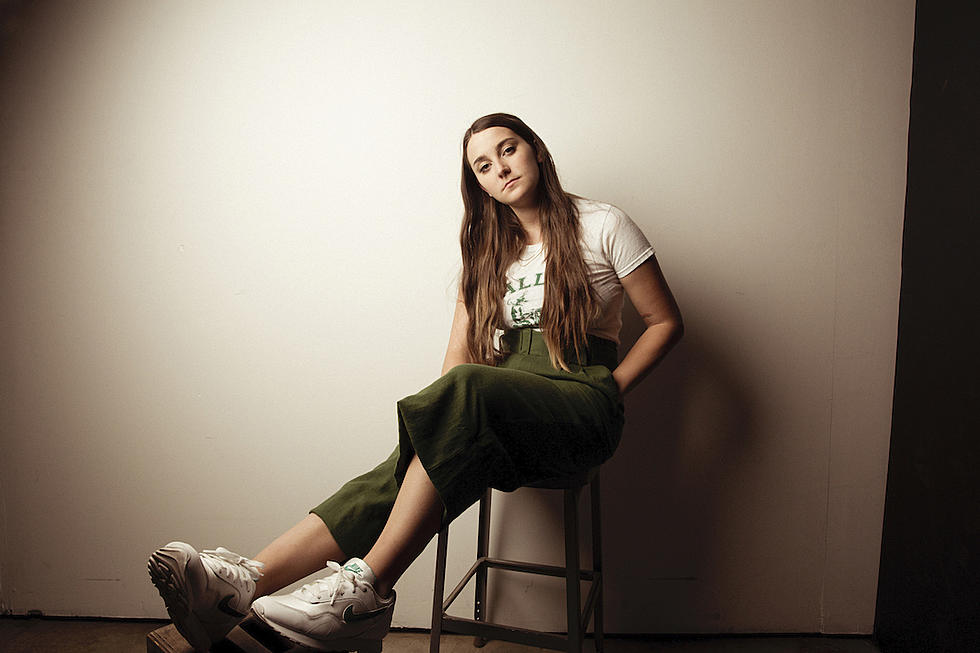
Interview: Katie Pruitt Tells Her ‘Loosely Chronological’ Coming-of-Age Story on Debut Album, ‘Expectations’
Katie Pruitt's debut album, Expectations, out Friday (Feb. 21), takes listeners through the singer-songwriter's coming-of-age story and changing perspective on love. "It ends with ["Out of the Blue,"] a love song to my girlfriend," Pruitt tells The Boot. "But to get there, I had to go through a lot of self-doubt, and then self-acceptance.
"Ultimately," she adds, "self-acceptance leaves room for real love with an actual person."
The project ends sweetly and simply, but the journey towards getting to that final love song is anything but. Pruitt's album begins -- as all good stories should -- at the beginning.
"[It's] loosely chronological, yes," she explains. "[The first track], "Wishful Thinking," being the first song I wrote for the record ... That one is about doubting love and doubting, like, the way society frames love for people: You meet someone and then you're saved -- that kind of mentality. I don't buy that. So it starts there, [asking] what love is, in general -- and that can be self-love, as well. So what does that mean, truly?"
Pruitt spent about four years crafting the collection of songs that became Expectations, and she says that when she started, making a record wasn't necessarily her goal. She wrote each of the project's 10 tracks solo.
"I have been just kind of sitting and mumbling over a guitar for years now," she jokes. "Literally, my process is that when I mumble something that feels true, or honest, or is something that maybe I've been trying to say for a while -- that's kind of what I go for. I just follow that road."
Each track on the album, she muses, marks a particular point along her process of self-discovery. "These songs are the 10 songs over the last four years that have all felt like personal revelations in my life: song that came to me in a crucial time, when I needed them, and was going through something and needed to talk about," Pruitt adds.
It's fair to say that each of those revelations dials into some aspect of the singer's concept of love, although that definition of "love" is very broad. Pruitt tackles feeling out of place in songs such as "Normal," which recalls her experiences with Catholic school and a hard-partying college culture. Elsewhere, in "My Mind's a Ship (That's Going Down)," Pruitt reflects on mental health.
It was also important to the singer to be transparent in this project about telling a queer love story, in part because she craved the specifics of that narrative as a young music fan herself. That's why the pronouns in the love songs feel so intentional and important, and why she speaks directly to the listener in "Loving Her," telling them that if they don't want to hear her love story, they can "turn the damn thing off."
As she speaks about writing "Loving Her," Pruitt remembers a conversation with her conservative-minded father, around the time she told him that she'd begun seriously dating her current girlfriend. "That was sort of a hard conversation, and I was very frustrated, because I was like, 'I don't get why this is hard for you,'" she relates. "'I'm the same me. I'm the same person. And I'm dating someone I love, who is a good person, so why does this matter?'
"So when he was like, 'I don't understand,' that kind of kept -- I was like, 'Well, why? What's to understand?' And I kind of wrote down that line, which is actually at the end of the song, 'People don't like what they don't understand,'" Pruitt continues. "And the next line I wrote after that was, 'If loving her's a sin, I don't want to go to Heaven.'"
Each song on Expectations represents a pivotal point in Pruitt's recent personal history. It wasn't until she had come out the other side, though, that she began grouping the songs together, arranging them into the framework of a record.
"By the time I felt like I had sort of lived those years and gone through the experiences I've gone through, it was like, 'Okay, this is a solid end to the record,'" she says, adding that she ended up with more than just a record. Writing her way through that stage of life allowed Pruitt to connect to the true, real love that she'd been skeptical of at the beginning.
"When you love yourself and accept yourself, you have room to give that to someone else, whereas before, I probably didn't," Pruitt reflects. "So, yeah, I think it just takes going through all those things to get to a conclusive [place], a little bit more of where I'm at today.
"Which is, luckily," she adds, "a happier place than where I started."
Who Is Katie Pruitt? 5 Things to Know
More From TheBoot









